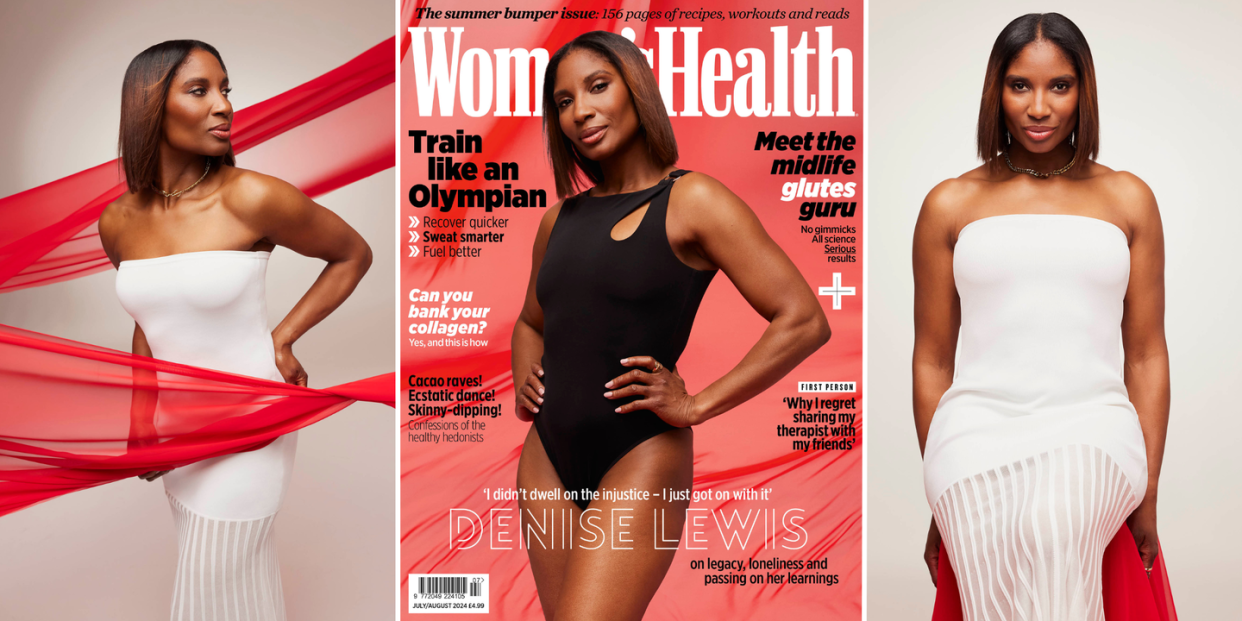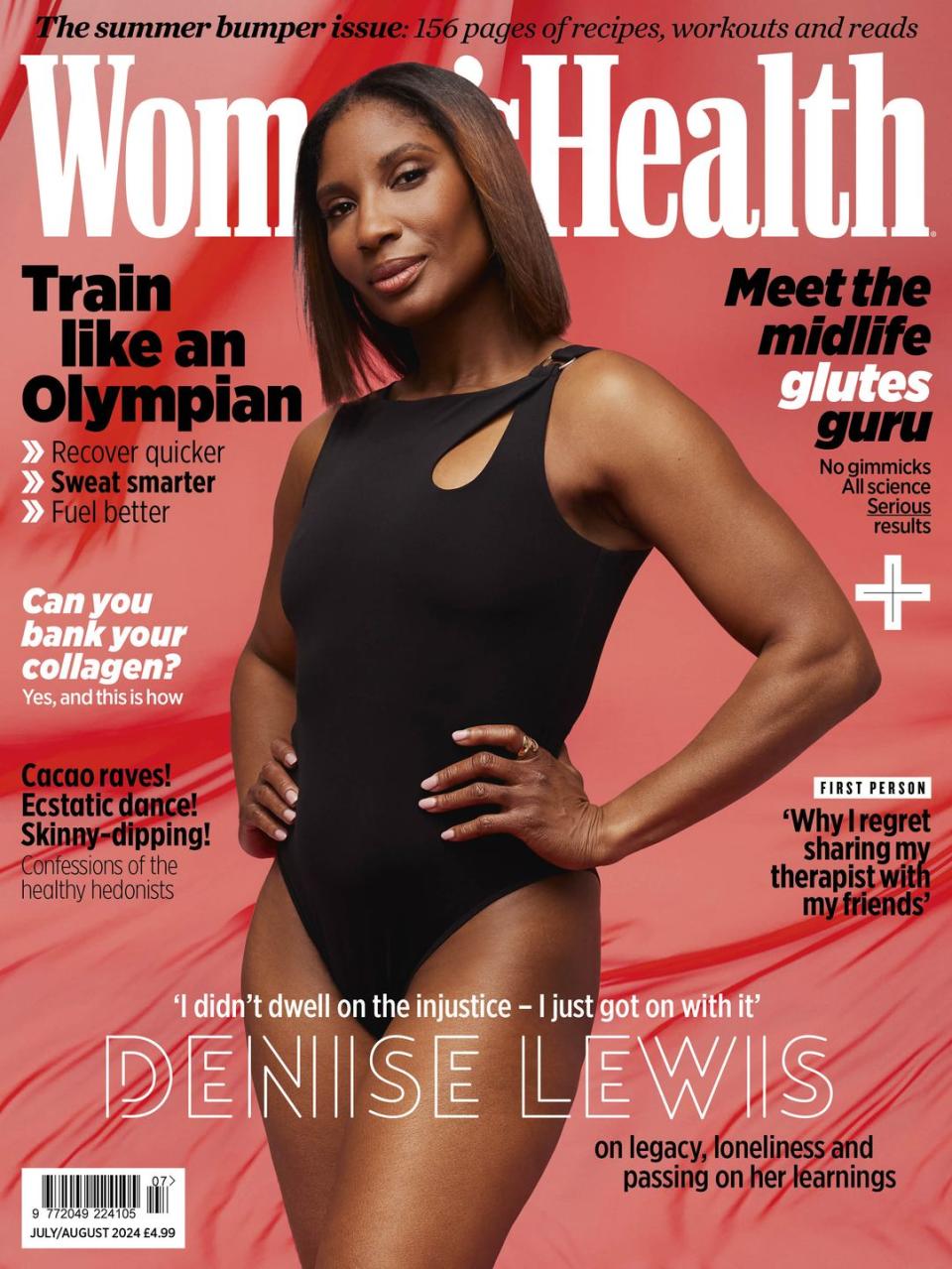Denise Lewis: ‘The progress for mums in elite sport is amazing – but I found it really triggering’

'Olympians are supposed to be superhuman,’ Denise Lewis tells me, after I reassure her that her joining our call three minutes late doesn’t warrant an apology. ‘Supposed to be’ being the operative phrase.
That Denise is well-acquainted with the fallibility of her fellow athletes is one reason why she makes a point of speaking with the newly retired – a period that can present a real risk factor for poor mental health – to see how they’re doing.
‘During the Olympic time, there’ll be athletes who come into the studio,’ she shares, of her role on the BBC’s Olympic broadcasting team. ‘If the opportunity arises, I will give them my reflections and my advice and opinion from someone who’s been there and who didn’t have anyone to talk to at the time. Because we were not that society where we shared feelings and emotions and chatted through openly about what was going on in our minds.’
Whether we’re talking about mental health or motherhood, the emotional transparency in the sporting world today compared with what Denise experienced in the 90s and 00s is a recurring theme throughout our conversation. Does she think today’s Olympians are afforded more humanity than she was? ‘Definitely,’ she replies.

She describes the decision of the US gymnast Simone Biles to withdraw from the Tokyo Olympics because of her mental health as a pivotal moment; four years on, Biles is going for gold in Paris. ‘She’s almost given sportspeople a pass to feel [they can] express that… it was quite enlightening and refreshing to see.’
Denise’s sport was the heptathlon; as such, we associate her with power and speed. But in her own life and career, she’s become a master of endurance. ‘I think there have been too many opportunities or scenarios where I’ve thought, “Okay, I need to steady my own ship here because no one else is going to do it for me,”’ she tells me, about the aftermath of Sydney in 2000.
To the watching world, Denise was the Olympic champion; the ‘golden girl’ with the million-dollar smile and eye-popping abs. But she was managing a potentially devastating foot injury. Then, the following year, she became pregnant with her eldest, Lauren. ‘The loneliness kicked in immediately,’ she recalls. ‘The general feeling was: you are on your own, coach-less, supportless, having a baby for the first time and coming off the highs of being an Olympic champion… [I went from] feeling that I was part of something really historic to then feeling isolation.’
Denise didn’t sit in the feeling. The ‘resilience piece’ – which she credits to her upbringing, being raised by her adored and adoring single mum Joan in West Bromwich – kicked in. ‘As an athlete and [with] an athlete’s brain, even as you’re going into pregnancy, if your intention is to continue, you’re thinking about when you get back… they say [after] you have your baby, [it takes] nine months to get back to feeling well again and on top of your game, but how does that translate to high performance?’

With those who guided her to Olympic glory absent, her support system consisted of her mum (who ‘stepped up as she always does and stopped work for a year to help me get back’), her former partner (and his mother, helping with childcare), Frank Dick – head coach for British Athletics at the time, who was acting as an overall adviser – and NHS antenatal staff. ‘Antenatal classes, that was where I was getting most of my advice from.’
It’s wild, right? The reigning Olympic champion – undergoing the colossal challenge of bringing herself back to peak performance postpartum. ‘I just sort of got on with it; I didn’t dwell on the injustice at the time,’ she recalls.
Fifteen months after giving birth she was back competing at the World Championships in Paris. How did she feel on that start line? ‘I was very nervous, still very unsure what I was capable of,’ she recalls. ‘I left being fifth in the world and just [with] a feeling of failure because then we didn’t celebrate; we didn’t talk about, “Oh, yes, there’s another mum returning to work [and] how wonderful, how amazing it is that she’s even on the start line.”’
Denise is tough. Formidable, even. But I detect some lingering pain. When did she start processing the emotions from this time? ‘If I’m really being honest, it’s only been over the past several years. When something is so bleak, you put the lid on it, you put the bow on it and you put it to the side; you just leave it; you just park it. But I found it a little bit triggering over the past sort of six years as we’ve talked about mums’ success in sport. Just because it’s...’ She takes a breath. ‘It’s forced me to delve back and go back to the time when it wasn’t the case… it has made me feel a little bit emotional at times.’ So stark is the contrast to her own experience.
While support for female athletes becoming mothers is far from perfect (as other stories within this article attest), Denise is emphatic that things are moving – and have moved – in the right direction. Pregnancy guidance for athletes does exist now, she points out, albeit only for athletes on the world-class performance programme. Her long lens on sport – and experience of the painful repercussions of dismissing female athletes’ off-track lives – makes her perspective invaluable.

‘Women’s sport keeps evolving. First, you’re fighting for the right to play… and then you add all these layers that have been previously overlooked – because we never talked about periods and menstrual cycles back in the day… every generation is moving the dial forwards, and better, for the next.’
For all her candour about the past, it’s when she’s talking about the future that Denise is most animated. So it seems only fitting that, for her next act, she’s leaning into her desire to help others sculpt a future they feel proud of; her first self-help book, Adaptability, will be published in March. It’s a trait with which Denise is well-acquainted.
Since having Lauren, now 23, she’s had three sons with her second husband – the youngest of whom, Troy, when she was 46. ‘I’d like to have the opportunity to share how you bring your best selves on this journey of womanhood,’ she begins. ‘How do you keep showing up for yourself, so you can keep delivering your energy for all your roles?’
Denise’s personal prescription for showing up for herself includes taking a diligent approach to her health; nurturing her microbiome (‘I’m fortunate that I found Symprove, having had a lot of problems with my gut health’), sweaty morning workouts and balanced nutrition. It also features self-advocacy.
‘[I communicated] that it’s important that I want to go back to work. I don’t want people to think that I was taking a second retirement because I was having a baby at 46. I’m still very much a career woman as well,’ she shares. ‘And in order to do that, I made sure that they were very much aware that I will be stepping away from certain responsibilities… [and] different jobs in the home.’

I enquire after what it’s like navigating the needs of different children, at different stages. ‘That’s the bit I’ve had to learn, because there are challenges,’ she says. ‘My perceived hierarchy is a challenge; this generation don’t see hierarchy in the same way – whether it’s parents, teachers. I’m grossly generalising, but they don’t see it. They’re just like: we’re all on a level; you respect me, I respect you.’
As for being pregnant at 46? ‘Physically, I didn’t feel any different to when I had Lauren,’ she says – caveating that she knows this will win her no fans. Then again, Olympians are supposed to be superhuman...
Denise is an ambassador for Symprove
More Olympics content...
How Shauna Coxsey built friends and followers on the climbing wall
This is what the athletes at the Paris Olympics will be eating
Adidas reveals the official Team GB kit for the 2024 Olympics and Paralympics
Cut through the noise and get practical, expert advice, home workouts, easy nutrition and more direct to your inbox. Sign up to the WOMEN'S HEALTH NEWSLETTER
You Might Also Like


